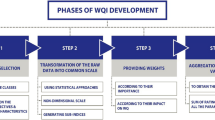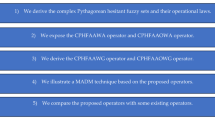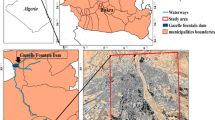Abstract
There has been an increasing need for the proper evaluation of river water quality in order to safeguard public health and to protect the valuable fresh water resources. In order to overcome the own limitations of the traditional evaluations which can only use a point value instead of an interval for grading standards, on the basis of the fuzzy binary comparison method (FBCM) and the theory of variable fuzzy sets (VFS), an integrated variable fuzzy evaluation model (VFEM) is proposed for the assessment of river water quality in this paper. This model possesses the preciseness of the algorithm and operability in practice, can well solve the grading standards which are interval form. In order to explore and compare the present method with other traditional methods, two cases studies in the Three Gorges and Tseng-Wen River are made. The results show that the proposed VFEM method can convey water cleanliness to certain degree by using the eigenvector of level H, which is much stricter in the superior level, and that it can improve the veracity for the assessment of water quality.



Similar content being viewed by others
References
Akbal F, Gurel L, Bahadir T et al (2011) Multivariate Statistical Techniques for the Assessment of Surface Water Quality at the Mid-Black Sea Coast of Turkey. Water Air Soil Pollut 216(1–4):21–37
Bordalo AA, Nilsumranchit W, Chalermwat K (2001) Water quality and uses of the Bangpakong River (Eastern Thailand). Water Res 35(15):3635–3642
Bu HM, Tan X, Li SY, Zhang QF (2010) Water quality assessment of the Jinshui River (China) using multivariate statistical techniques. Environ Earth Sci 60(8):1631–1639
Chang NB, Chen HW, Ning SK (2001) Identification of river water quality using the Fuzzy Synthetic Evaluation approach. J Environ Manag 63(3):293–305
Chau KW (2006) A review on integration of artificial intelligence into water quality modelling. Mar Pollut Bull 52(7):726–733
Chen SY (1998) The theory and application of engineering fuzzy sets (in chinese). National Defence Industry Press, Beijing
Chen SY (1999) Decision-making model according to language customer of Chinese (in chinese). J Dalian Univ Technol (Soc Sci) 20(2):8–10
Chen SY (2005) Theory and model of engineering variable fuzzy sets - mathematical basis for fuzzy hydrology and water resources (in Chinese). J Dalian Univ Technol 45(2):308–312
Chen SY (2009) Theory and model of variable fuzzy sets and its application. Dalian university of technology press, Dalian
Dahiya S, Singh B, Gaur S, Garg VK, Kushwaha HS (2007) Analysis of groundwater quality using fuzzy synthetic evaluation. J Hazard Mater 147(3):938–946
Dökmen F, Aslan Z (2013) Evaluation of the Parameters of Water Quality with Wavelet Techniques. Water Resour Manag 27(14):4977–4988
Fulazzaky M (2009) Water Quality Evaluation System to Assess the Brantas River Water. Water Resour Manag 23(14):3019–3033
Icaga Y (2007) Fuzzy evaluation of water quality classification. Ecol Indic 7(3):710–718
Kirchner JW, Feng XH, Neal C, Robson AJ (2004) The fine structure of water-quality dynamics: the (high-frequency) wave of the future. Hydrol Process 18(7):1353–1359
Liou SM, Lo SL, Hu CY (2003) Application of two-stage fuzzy set theory to river quality evaluation in Taiwan. Water Res 37(6):1406–1416
Liu H, Qu J (2002) Water quality evaluation of the Three Gorges Reservoir area. Environ Sci (in Chinese) 23(1):75–77
Lu RS, Lo SL (2002) Diagnosing reservoir water quality using self-organizing maps and fuzzy theory. Water Res 36(9):2265–2274
Lu RS, Lo SL, Hu JY (1999) Analysis of reservoir water quality using fuzzy synthetic evaluation. Stoch Env Res Risk A 13(5):327–336
Ocampo-Duque W, Ferre-Huguet N, Domingo JL, Schuhmacher M (2006) Assessing water quality in rivers with fuzzy inference systems: A case study. Environ Int 32(6):733–742
Ott WR (1978) Water quality Indices: A Survey of Indices Used in the United States, EPA-600/4-78-005. US Environmental Protection Agency, Washington, DC
Ouyang Y (2005) Evaluation of river water quality monitoring stations by principal component analysis. Water Res 39(12):2621–2635
Panepinto D, Genon G (2010) Modeling of Po River Water Quality in Torino (Italy). Water Resour Manag 24(12):2937–2958
Parinet B, Lhote A, Legube B (2004) Principal component analysis: an appropriate tool for water quality evaluation and management–application to a tropical lake system. Ecol Model 178(3–4):295–311
Shouyu C, Yu G (2006). Variable Fuzzy Sets and its Application in Comprehensive Risk Evaluation for Flood-control Engineering System. Fuzzy Optim Decis Making 5(2):153–162
Singh KP, Malik A, Mohan D, Sinha S (2004) Multivariate statistical techniques for the evaluation of spatial and temporal variations in water quality of Gomti River (India)–a case study. Water Res 38(18):3980–3992
Singh B, Dahiya S, Jain S, Garg VK, Kushwaha HS (2008) Use of fuzzy synthetic evaluation for assessment of groundwater quality for drinking usage: a case study of Southern Haryana, India. Environ Geol 54(2):249–255
Stambuk-Giljanovic N (1999) Water quality evaluation by index in Dalmatia. Water Res 33(16):3423–3440
State Environmcntal Protection Administration of China (SEPAC) (2002) Environmental quality standards for surface water, GB383822002. China Environmental Science Press, Beijing
Wang D, Singh VP, Zhu Y (2007) Hybrid fuzzy and optimal modeling for water quality evaluation. Water Resour Res 43, W05415. doi:10.1029/2006WR005490
Wang D, Singh VP, Zhu YS, Wu JC (2009) Stochastic observation error and uncertainty in water quality evaluation. Adv Water Resour 32(10):1526–1534
Wang XJ, Zhao RH, Hao YW (2011) Flood Control Operations Based on the Theory of Variable Fuzzy Sets. Water Resour Manag 25(3):777–792
Wang Y, Sheng D, Wang D, Ma H, Wu J, Xu F (2014) Variable Fuzzy Set Theory to Assess Water Quality of the Meiliang Bay in Taihu Lake Basin. Water Resour Manag 28(3):867–880
Zadeh LA (1965) Fuzzy sets. Inf Control 8(3):338–353
Zhang Q, Li ZW, Zeng GM et al (2009) Assessment of surface water quality using multivariate statistical techniques in red soil hilly region: a case study of Xiangjiang watershed, China. Environ Monit Assess 152(1–4):123–131
Zhang D, Wang GL, Zhou HC (2011) Assessment on agricultural drought risk based on variable fuzzy sets model. Chin Geogr Sci 21(2):167–175
Zou Q, Zhou JZ, Zhou C, Song LX, Guo J (2013) Comprehensive flood risk assessment based on set pair analysis-variable fuzzy sets model and fuzzy AHP. Stoch Env Res Risk A 27(2):525–546
Zou Z, Yun Y, Sun JN (2006) Entropy method for determination of weight of evaluating indicators in fuzzy synthetic evaluation for water quality assessment. J Environ Sci 18(5):1020–1023
Acknowledgment
This research was supported by Program for Science & Technology Innovation Talents in Universities of Henan Province (13HASTIT034), the foundation for University Backbone Teacher of Henan Province (2012GGJS-099) and Central Research Grant of Hong Kong Polytechnic University (4-ZZAD). We gratefully acknowledge the thorough and insightful comments by the editor and anonymous reviewers.
Author information
Authors and Affiliations
Corresponding author
Rights and permissions
About this article
Cite this article
Wang, Wc., Xu, Dm., Chau, Kw. et al. Assessment of River Water Quality Based on Theory of Variable Fuzzy Sets and Fuzzy Binary Comparison Method. Water Resour Manage 28, 4183–4200 (2014). https://doi.org/10.1007/s11269-014-0738-4
Received:
Accepted:
Published:
Issue Date:
DOI: https://doi.org/10.1007/s11269-014-0738-4




